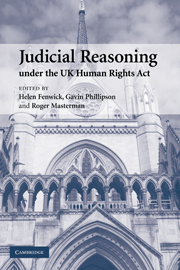Book contents
- Frontmatter
- Contents
- List of contributors
- Foreword
- Preface and acknowledgments
- Table of cases
- Table of legislation
- Table of treaties
- 1 The Human Rights Act in contemporary context
- PART I The interpretation of the Human Rights Act 1998
- 2 The European Convention on Human Rights and the Human Rights Act: the view from the outside
- 3 Aspiration or foundation? The status of the Strasbourg jurisprudence and the ‘Convention rights’ in domestic law
- 4 Institutional roles and meanings of ‘compatibility’ under the Human Rights Act 1998
- 5 Choosing between sections 3 and 4 of the Human Rights Act 1998: judicial reasoning after Ghaidan v. Mendoza
- 6 Clarity postponed: horizontal effect after Campbell
- 7 The standard of judicial review after the Human Rights Act
- 8 Principles of deference under the Human Rights Act
- PART II The Human Rights Act and substantive law
- Index
3 - Aspiration or foundation? The status of the Strasbourg jurisprudence and the ‘Convention rights’ in domestic law
Published online by Cambridge University Press: 30 October 2009
- Frontmatter
- Contents
- List of contributors
- Foreword
- Preface and acknowledgments
- Table of cases
- Table of legislation
- Table of treaties
- 1 The Human Rights Act in contemporary context
- PART I The interpretation of the Human Rights Act 1998
- 2 The European Convention on Human Rights and the Human Rights Act: the view from the outside
- 3 Aspiration or foundation? The status of the Strasbourg jurisprudence and the ‘Convention rights’ in domestic law
- 4 Institutional roles and meanings of ‘compatibility’ under the Human Rights Act 1998
- 5 Choosing between sections 3 and 4 of the Human Rights Act 1998: judicial reasoning after Ghaidan v. Mendoza
- 6 Clarity postponed: horizontal effect after Campbell
- 7 The standard of judicial review after the Human Rights Act
- 8 Principles of deference under the Human Rights Act
- PART II The Human Rights Act and substantive law
- Index
Summary
Introduction
In A Bill of Rights for Britain, Ronald Dworkin advocated the incorporation of the European Convention on Human Rights into domestic law to halt the ‘decline in the culture of liberty’ that had affected freedom in the UK since the 1970s. He rejected the idea of adopting a newly drafted domestic instrument on the ground that – with the Convention still enforceable at Strasbourg – ‘potential conflict between the two fundamental charters of rights would be a source of wasteful confusion’. That the incorporated Convention could be as powerful an instrument as such a Bill of Rights was not, however, in doubt:
Incorporation would put the special skills of British lawyers and judges, and the heritage of British legal principle, at the service of the civilised world. Britain could become once again a leader in defining and protecting individual freedom, instead of a sullen defendant giving ground to liberty only when ordered to do so by a foreign court.
Dworkin saw that, in the hands of the domestic judiciary, the framework provided by the Convention might be crafted to form a ‘distinctly British scheme of human rights and liberty’, and that specifically:
British judges could certainly adopt … a more generous interpretation, using the rich and special traditions of the British common law to develop out of the Convention a particularly British view of the fundamental rights of citizens in a democratic society.
- Type
- Chapter
- Information
- Judicial Reasoning under the UK Human Rights Act , pp. 57 - 86Publisher: Cambridge University PressPrint publication year: 2007
- 3
- Cited by



